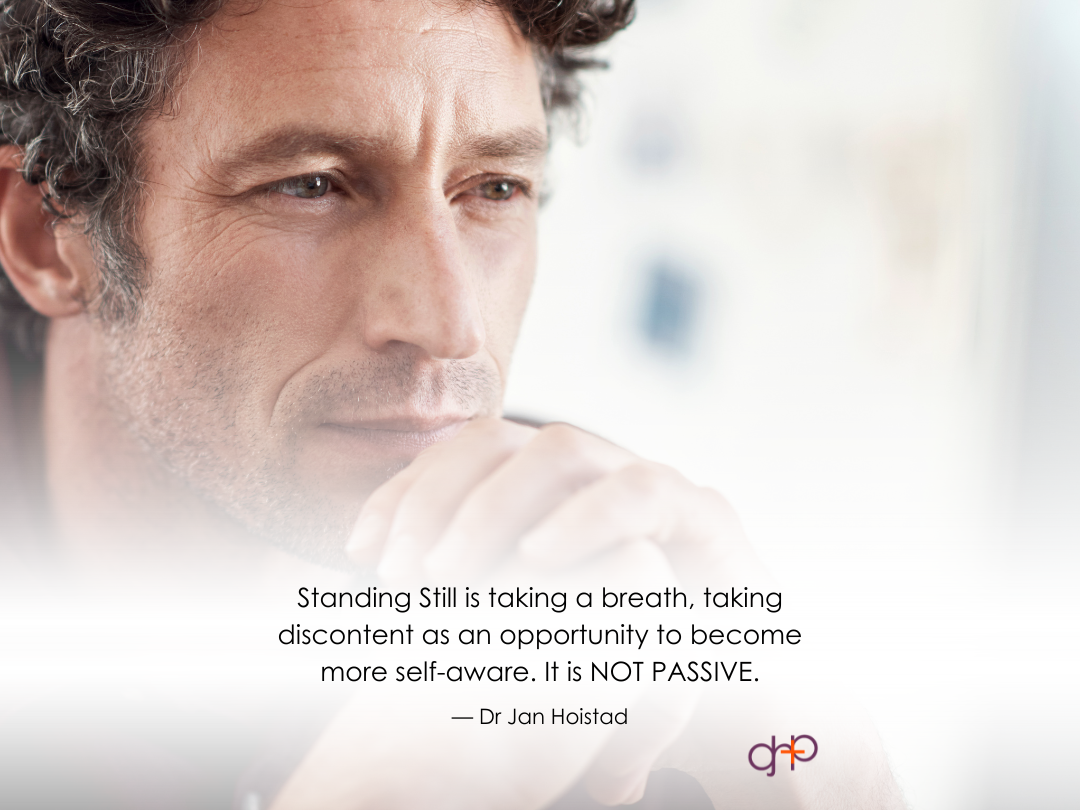
People seldom seek change when things are going well. Seeking to grow during these times is then a choice versus a push from outside. Because the force of nature is all about growth, if we are not doing so, circumstances will arise to create discontent or provide circumstances that force a change–desired or not.
So the internal or external circumstances leading to the desire for work-life change are less important than how you approach it. You might as well embrace it.
Where Are You Going to Focus Your Attention?
Instead of exiting a job dramatically, seeking a promotion with lots of over-zealous activity, or starting a new venture flailing about trying everything that the media says you should do, I advise what I call Standing Still. Standing Still is taking a breath, taking the discontent as an opportunity to become more self-aware so you assess fully, listen to what the discontent is telling you, and then, from that centered place, open yourself to new possibilities that are right for you.
If you scramble and make a change in a state of anxiety or desperation, the chances of your new life or work being truly satisfying are slim. If you make a desperate move it’s like treading water or losing ground. Instead, thoughtfully create steps that actually lead where you want to go. If you do nothing, you’ll be right where you are now.
Simply put – Slowing down can actually help you go further, faster. KEEP Reading for Four Tips that help you create wise and lasting change.
Stand Still and Focus on Increasing Your Self-Awareness
I know this is very difficult to slow down right now. But in the long run, once you gain clarity, you be able to go further, faster.
Standing Still is taking a breath, taking discontent as an opportunity to become more self-aware. It is NOT PASSIVE. It’s just a quieting of the mental chatter and a calming of the physical fidgeting so you can see things differently. So you can open to opportunities you may not see otherwise.
– Dr. Jan Hoistad
I have 4 suggestions outlined below for ways to focus your attention. These 4 tips will help you to navigate through discontent toward the change you desire. These suggestions are powerful and empowering. They grow out of numerous observations—of my client’s lives and from my own professional life.
They may seem counter-intuitive to many. Some employers, co-workers, or family and friends may be up-in-arms at what I know works. I’m not suggesting you stop doing a good job at work. In fact, on the contrary, be professional, fulfill your responsibilities, but do it with self-awareness.
You may also be frustrated with the suggestion to slow down, stand still and do what I’m suggesting, in the eagerness to quickly get out of discontent. If you focus on these suggestions you may find yourself curious rather than frustrated.
Over the years these observations unearthed common sense, as together my clients and I mapped the path that led each individual from where they were in their discontent to where they wanted to be. From looking for something “new” or “different,” “better use of my talents” or simply “a more rewarding work-life” (less often financially and more often emotionally, intellectually, or relationship rewarding) to the deeper qualities, needs, self-expressive circumstances and supportive relationships that would truly nourish their work and thus, whole lives.

Coaching through career and life choices and discontent may feel like it slows you down to become more self-aware. In the long run, it will help you go further, faster!
Listen to Your Discontent in a New Way
Learning to listen in a new way—from your elevated self, raising expectations of yourself, taking the time to get to know yourself, and committing to becoming your best self—is the invitation of life. Discontent is just one of the messengers.
Learning to listen in a new way means listening from the inside; not outside. Listening not as a potential employer or business evaluator, but for the threads of unique creativity or excitement, the creative application of expertise and know-how, the ideas, time, and energy that brought others profit, but did not necessarily reward the individual with more acknowledgment or career growth. When appropriate, this allows my coaching clients and me to see and hear what is important in a new way.
4 Tips to Create Wise and Lasting Change
1. Preserve Your Time
To explore your discontent and do something new or different in your work-life, you will need to carve out some time. I know. You feel you have NO TIME. However, time is THE top commodity for all leaders; it’s the top commodity for any real and satisfying change. So be open to new ways you might manage your time wisely and preserve some for yourself.
I cannot specify just how much time you’re going to need for the particular career or life changes you desire or are working on. I simply encourage you to keep an open mind as you observe how you give away your time and you discover what kind of time boundaries you need to set.
Start by observing yourself. Then you can start with small changes.
Now before you panic, and before I give you an example of preserving your TIME I want to talk about the 2nd secret which is conserving Your Energy. These two are often linked.
Here’s how it works.
2. Conserve Your Energy
Transformation—which is making those changes stick so they are deep and long-lasting—requires emotional and psychic energy. This kind of energy makes people think they are “doing nothing” or ”wasting time” but it’s often more draining than lots of busywork. Lasting change requires time.
Now no one else can see the energy required, but you’re going to need it. You are going to need time and space to think and envision; to sleep, dream, and rest. Probably while you keep your current work-life and figure out what you really need.
Change requires time. Transformation—which is making those changes stick so they are deep and long-lasting—requires emotional and psychic energy.
So start by noticing every place you give without being directly asked for help, or every time you overgive when less is what’s required. People who are discontent are often over-achievers, giving more to others and neglecting their own needs. As some of my clients who have practiced these suggestions, you are probably a great problem-solver, giver, fixer, and everyone around you lets you do it. You have to figure out if that’s what you want to be known for, and if that’s what your identity is founded on.
3. Preserve Your Creativity
Top leaders use their creative ideas wisely. If you are discontent in your current work-life, it’s important that you learn when and how to share your creative ideas, innovations, solutions, or insights.
I suspect that you have deep-seated creativity that you simply take for granted. You may even be saying, “No Jan that’s not me,” but if we did a work-life overview (which I encourage you to do by the way) you’d probably list many ways in which you applied your creativity—again to helping others achieve their goals.
Right now you are discontented. I’m not suggesting you be withholding, simply make better choices about what you share. Preserve your ideas, solutions, and creativity so you can learn from it as it bubbles up, so you find a good new home or outlet for it where it is truly welcomed, appreciated, and rewarded.
4. Conserve Your Expertise (and Maybe Even Your Money too!)
Maybe you don’t value or even think about the value of your expertise. Again expertise is a valuable commodity to be shared at appropriate times with the people who truly see and reward your contributions—versus squandering or hijacking them.
You’re probably like my clients many of whom give it away, they are not compensated for it; thus others don’t value you, they take you for granted, and you end up resentful.
Many of those in management or director-level positions make huge amounts of money for others and are not rewarded themselves. Some even practically run companies without being brought on as partners. They are greatly undervalued.
The challenge is to not give away all your “Goodies!”: Again, your challenge is to do what is required—while you figure out what you really want to do—but to not give away all your goodies!
Write down all the ways you have freely helped others and note the cost-benefit to them (it may be a person or a company) and the cost drain or loss to you (how were you compensated or taken for granted?)
Your expertise is valuable and can make you financially profitable if you put yourself first to figure out your new direction. From that place of clarity, you will be a wise and valued contributor, leading in your work and life.
For more on this topic read my articles:
- How Career Coaching Continues to Change Lives
- 7 Ways to Focus When You’re Unhappy and Looking for a New Career
- 2 Steps to Create Security When Itching To Leave Your Job
- 3 Ways Career Coaching Can Help You Achieve Your Goals
- Tackle a Career Transition or Job Change with Confidence in 2020 and Beyond
- Couples and Career Transitions: 4 Steps to Maximize Your Success
- Successful Business or Career Transition Planning Should Always Include Your Mate
- Many more on how couples manage transitions together are found here
For more resources and guidance on business, career, and relationship strategies designed to move you and your life further and faster, request your free Discovery Call with Dr. Jan Hoistad today.

